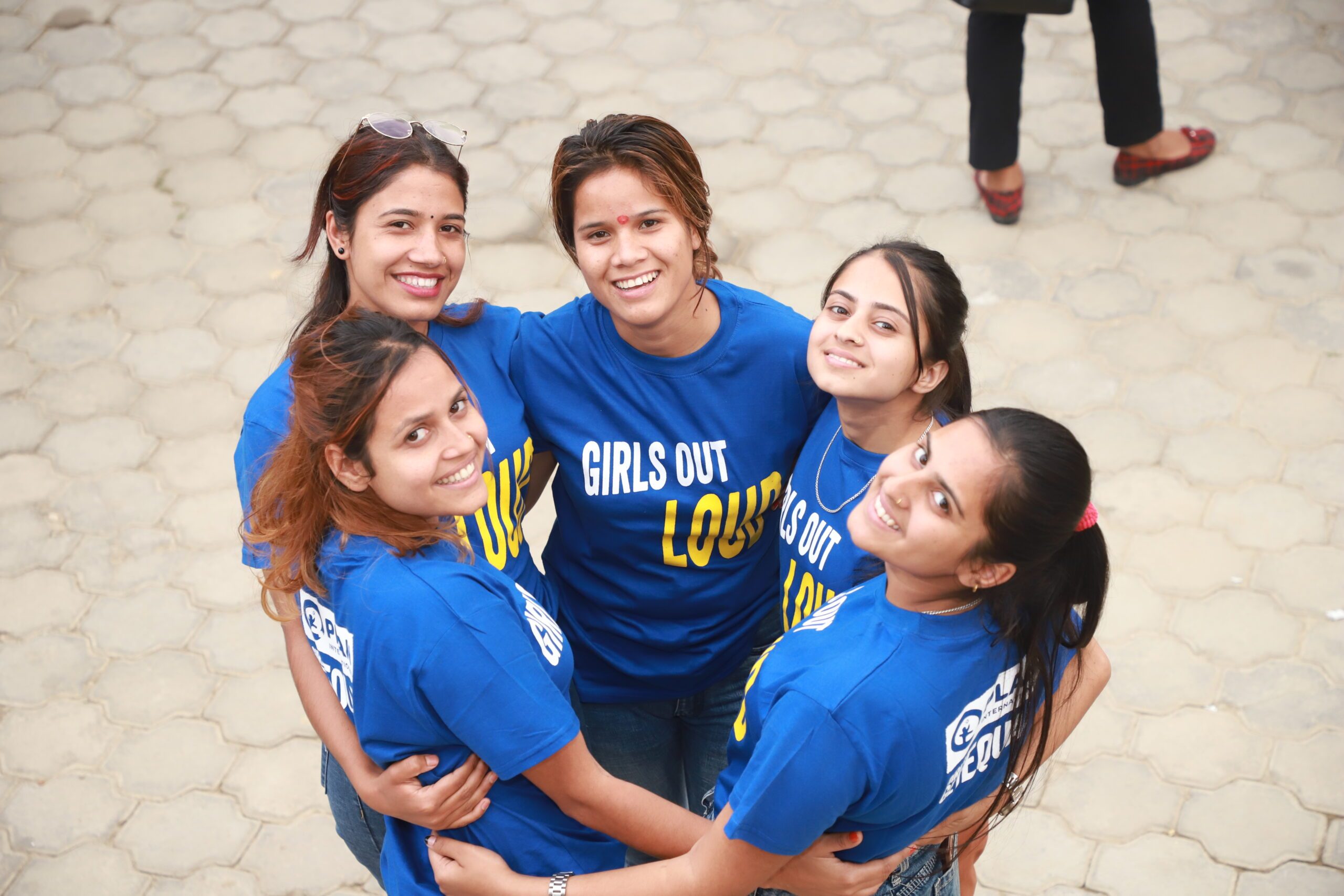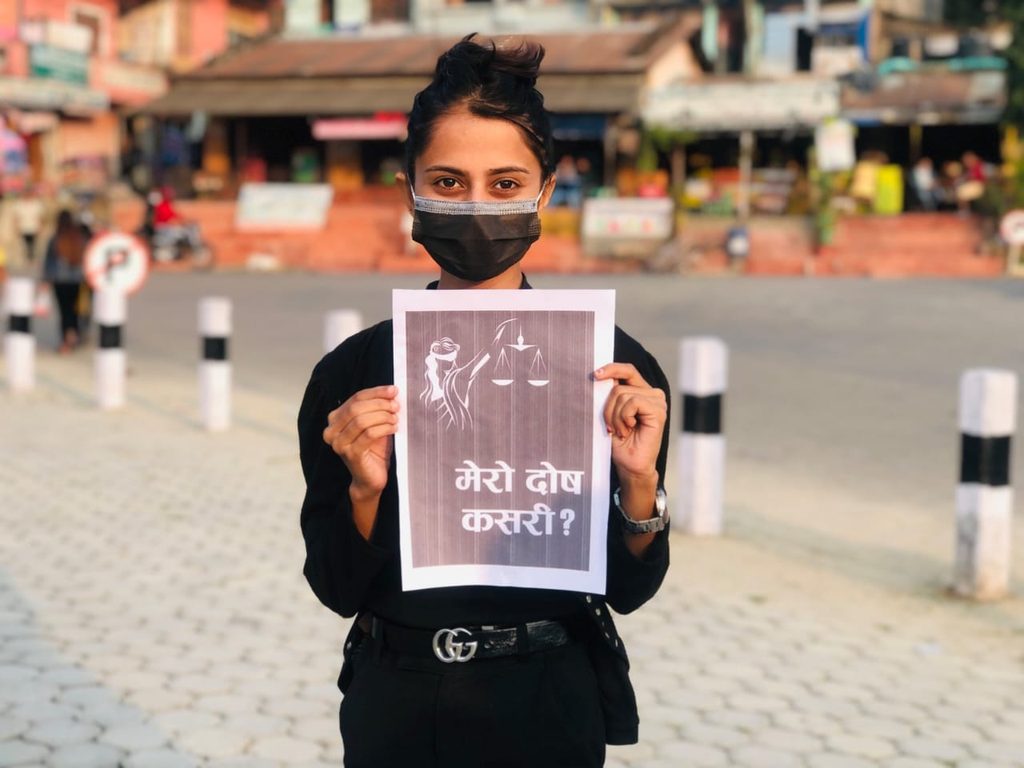The girl changing perceptions of politics in Nepal
Swastika, 19, is changing the face of politics in Nepal. Through campaigning and raising awareness, she is showing that girls belong in the political sphere.

Swastika is a member of Girls Out Loud, a safe online space conceived by Plan International Nepal for girls and young women between 13 and 24 to discuss key gender issues. In closed Facebook groups moderated by trained staff, girls are asking questions and discussing topics such as sexual health and rights, menstruation, gender violence, and self-confidence.
“Mostly when young people talk about politics, they don’t really want to get involved because they think politics is dirty,” explains Swastika, 19, who is from Sindhuli district and is currently at college studying political science.
In Nepal, it is common practice for political parties to visit local schools as part of their canvassing ahead of elections. Children as young as 6 are targeted with propaganda and taught to support the parties that their schools or teachers are affiliated with. Swastika, who believes that politics can and should be a force for good, feels uncomfortable with children being used in this way. “School should be a safe space for children to get an education,” she says.
Meaningful engagement in politics
Swastika has therefore thrown herself into campaigning for young people to take part in politics in a more meaningful and less tokenistic way. She sees it as important that young people make the most of their right to vote, but for a party that will stand up for their interests.
“Political parties always remain silent when we approach them on condition of school buildings, child rights or requesting their support to end child, early and forced marriage,” she says. “It’s our right to vote. That right should be used. Young people should vote, but not just for the candidate they know, they should vote for the candidate who will do right for them and for our country. If somebody is supporting a party just for the sake of money, or because the party has bribed them, that is something I am totally against.”
She is particularly proud that, with the support of Plan International Nepal and partner organisation Children as Zones of Peace (CZOP), following an online and media campaign called #NoPoliticsinSchool ahead of municipal elections in May 2022, she was able to convince her local government to prohibit political canvassing in schools and the use of schools as polling stations. As part of her campaign, she also encouraged girls and young women to register for voter IDs, enabling them to cast their votes from the age of 18.
We need to make girls aware that politics isn’t always dirty.
Although political canvassing in schools in Swastika’s municipality has reduced, in other areas it has increased, especially in rural areas, so she continues to visit schools to speak to students about the importance of using their vote meaningfully. A common problem is that teachers are often themselves politically involved, which means that students feel that if they do not support their chosen party, they could run into problems.
“They have been brainwashed in such a way that students think that if they don’t support the party they are told to, they will be in trouble,” Swastika explains. Despite this, she sees her campaign as one of her biggest achievement and is proud that as a young woman, she has been able to achieve meaningful change.
Political participation causes abuse
However, the campaign has come at a cost to Swastika and her family, who have faced threats as a result. “People have come to my family to complain, saying a girl from your family is working against us and that won’t be good for you if we win, we will harm your family and harm your girl,” she explains. This has made her feel unsafe and has made it harder for her to continue with her campaigning.
It also gives her mixed feelings when other young women tell her they want to get involved in politics. “It makes me happy, but I also fear that it will be hard for them. Every time I go to college, I am fearful that there will be trouble or that someone will threaten me. I have to be alert and I do feel that I could be in danger. So while I want to encourage other girls to be political, I worry about the consequences this might have.”
Swastika believes that girls face barriers that boys don’t when it comes to participating in politics. “Whenever girls get involved in politics, their character is questioned,” she explains. “People will ask, why is a girl going into politics? Why is she being oversmart? Even when girls want to lead, there is no space for them to. Politics is seen as a topic that girls shouldn’t get involved in. They have that fear that they will be questioned and that it will affect their standing in society later, because it becomes associated with their family’s reputation and honour.”
Part of the problem is that often in Nepal, politics is associated with rallies and protests which can be antagonistic and violent. “Girls are not expected to go in protests and they should not go outside much doing things like that.
Girls belong in politics
“We live in a patriarchal society where it’s common to believe that whatever men decide, we should go with,” she continues. “All of the main spaces where decisions are made are dominated by men. And when woman are included, perhaps because of quotas, men often only want to include women who comply with them and will not speak for women.
“They don’t want someone like me who is really politically engaged, someone who does their research and knows the reality. People like me get pushed away. I get told I’m a small kid, don’t get involved in politics, you don’t know anything. They fear that because I know about politics, I will bring up things that go against their agenda so they don’t want me involved.”

Swastika was heartened, however, that in May’s elections, a 32-year-old independent candidate won a position for the first time in Nepal’s history. “He is also a youth, so that’s a huge achievement for Nepal,” she says. “This is the first time in Nepal’s history that we have an independent candidate who won an election rather than someone from a political party.”
Positive perceptions of politics
She believes it is important to change young people’s perceptions of politics, especially girls. “We need to make girls aware that politics isn’t always dirty. It’s not always about going to protests. Directly or indirectly, politics is related to every aspect of the life of every person, whether you are a girl or a boy or any other person.
“There needs to be awareness amongst people that politics is also for good and that politics can bring good. That’s important not just for young people but people in general as well.” As part of this, Swastika is now doing a research project on how young people engage with politics, comparing Nepal with other countries, so that she can understand how other countries have been able to encourage more girls to get involved.
In future, she hopes to publish a book based on her research and to move to Kathmandu, Nepal’s capital. While she isn’t yet sure what she would like to do with her career, she wants to continue her political campaigning and perhaps even one day become a political leader. She is also interested in becoming a social worker with a focus on children, especially children with health problems, who in Nepal are often disadvantaged. Irrespective of whether she goes in politics or social work, she wants to continue working for children and making children’s lives better.
Categories: Campaigns, Youth empowerment


